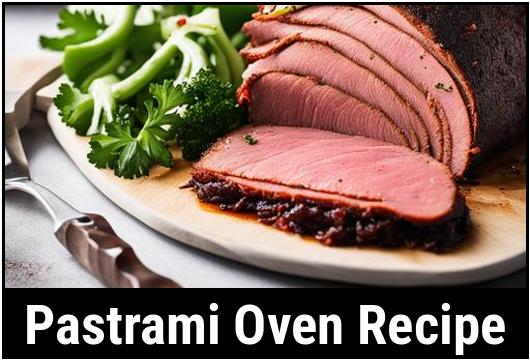
Pastrami Oven Recipe: A Comprehensive Guide
Are you ready to embark on an epic culinary journey, diving into the exquisite world of pastrami? In this comprehensive article, we will explore every aspect of preparing pastrami in the oven, from selecting the perfect cut of meat to achieving the ideal level of doneness. So let’s get started!
Understanding the Food Science behind Pastrami
Before we delve into the nitty-gritty details of preparing pastrami in the oven, it’s essential to understand the science behind this beloved delicacy. Pastrami is traditionally made from beef brisket, which is a relatively tough cut of meat. Through a process called “curing,” the meat becomes incredibly tender and gains a depth of flavor that is simply irresistible.
Curing involves the use of a curing salt mixture, which usually consists of salt, sugar, and various spices. The salt helps to draw out the excess moisture from the meat while enhancing its flavor. Additionally, the sugar helps balance the saltiness and adds a touch of sweetness. The spices not only infuse the meat with aromatic flavors but also contribute to its distinctive taste.
Culinary Details: Selecting the Perfect Cut of Meat
When it comes to pastrami, selecting the right cut of meat is crucial. The classic choice for pastrami is beef brisket, known for its marbling and strong beefy flavor. Look for a well-marbled piece with a good amount of fat running through the meat. The fat will render during the cooking process, imparting richness and tenderness to the final product.
While beef brisket is the traditional choice, you can also experiment with other cuts like beef plate or even pork shoulder for a delectable twist on the classic recipe. However, keep in mind that the cooking times and flavors may vary when using alternative cuts of meat.
Cleaning and Preparation: Setting the Stage for Pastrami Magic
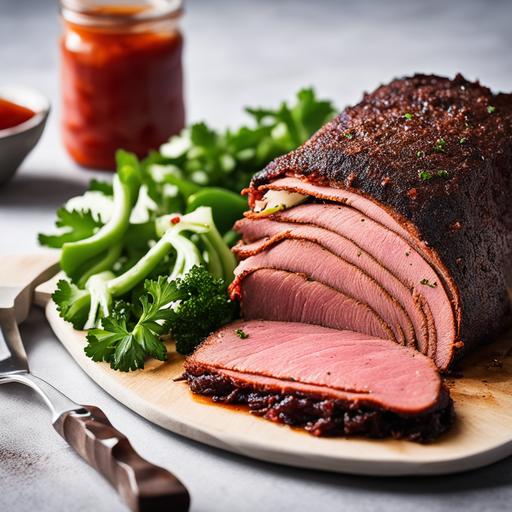
Before diving into the preparation process, ensure you have a clean and organized workspace. Proper hygiene is paramount when handling raw meat. Thoroughly clean cutting boards, utensils, and your hands to avoid cross-contamination and ensure food safety.
To begin the pastrami preparation, start by rinsing the beef brisket under cold water to remove any surface impurities. Pat the meat dry with paper towels, ensuring it is moisture-free to allow for better spice penetration during the curing process.
Tips and Tricks for Flavorful Pastrami
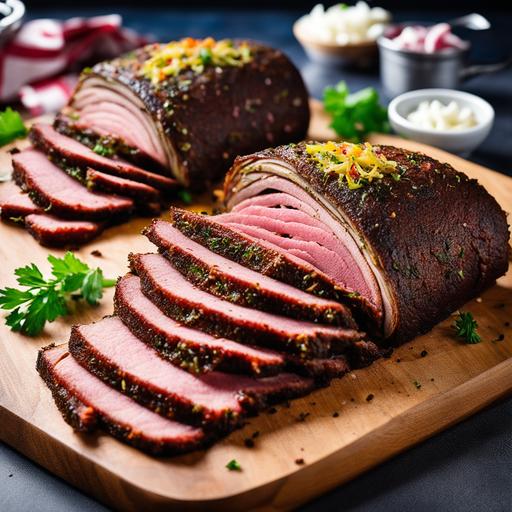
- Curing Time: The length of the curing process plays a vital role in developing the flavors and tenderness of your pastrami. It is recommended to cure the beef brisket for at least 6-7 days to ensure optimal results. However, you can adjust the curing time based on your personal preference, with longer curing times resulting in a more intense flavor.
- Spice Rub Options: While the classic pastrami spice rub includes ingredients like black peppercorns, coriander seeds, and garlic powder, don’t be afraid to get creative! Add mustard seeds, smoked paprika, or even a hint of cinnamon to elevate the flavor profile of your pastrami.
- Spice Grinding: To maximize the aroma and flavor of your pastrami’s spice rub, consider grinding the spices right before use. This ensures the essential oils are released, intensifying the overall taste experience.
- Smoking: To achieve that iconic smoky essence, many pastrami enthusiasts opt to smoke their cured meat before heading to the oven. If you have access to a smoker, this step can add an extra layer of complexity to your pastrami. However, it should be noted that smoking is not mandatory, and excellent results can still be achieved solely in the oven.
- Resting Period: After the pastrami finishes cooking in the oven, allow it to rest for at least 15-20 minutes before slicing. This rest period allows the juices to redistribute, ensuring maximum tenderness and flavor in every bite.
Achieving the Perfect Doneness
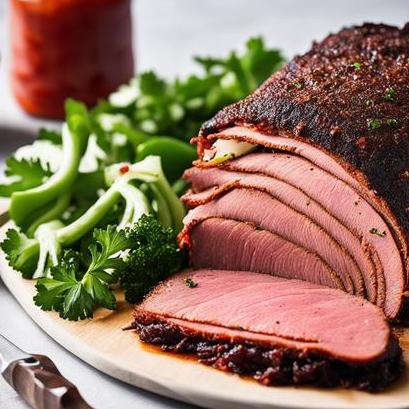
Determining the perfect level of doneness for pastrami can be an intimidating task, but fear not! By following some key indicators, you’ll have that sought-after tender and juicy pastrami in no time.
- Internal Temperature: The most accurate way to gauge doneness is by using a meat thermometer. Pastrami is typically considered fully cooked when the internal temperature reaches 195°F (90°C). This temperature ensures that the connective tissues have sufficiently broken down, resulting in tender, succulent meat.
- Meat Texture: Another visual and tactile sign of doneness is the texture of the meat. When the pastrami is ready, it should be easy to insert and remove a fork from the meat, with little to no resistance. Additionally, the meat fibers should pull apart easily while still maintaining their structural integrity.
A Step-by-Step Pastrami Oven Recipe
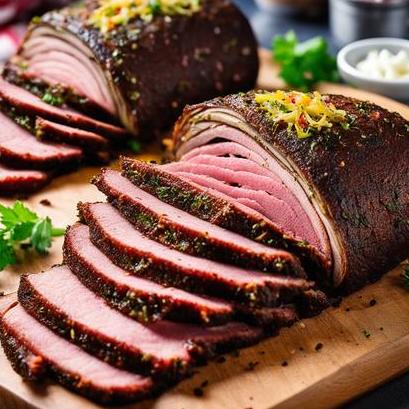
Now that we have explored the food science, culinary details, and crucial tips, let’s dive into a step-by-step pastrami oven recipe. This recipe will guide you through the entire process, ensuring you achieve spectacular results.
Ingredients:
- 1 beef brisket (approximately 4-5 pounds)
- ¼ cup kosher salt
- ¼ cup brown sugar
- 2 tablespoons coarsely ground black pepper
- 1 tablespoon coriander seeds, crushed
- 1 tablespoon yellow mustard seeds
- 1 tablespoon garlic powder
- 1 tablespoon smoked paprika
Instructions:
- In a small bowl, combine kosher salt, brown sugar, black pepper, crushed coriander seeds, mustard seeds, garlic powder, and smoked paprika. Mix well to create the spice rub.
- Rinse the beef brisket under cold water, and pat it dry using paper towels.
- Generously coat the entire brisket with the spice rub, pressing it firmly onto the meat to ensure optimal flavor penetration.
- Place the seasoned brisket into a large resealable bag or wrap it tightly in plastic wrap. Make sure to remove any excess air, creating a snug seal.
- Refrigerate the brisket for a minimum of 6-7 days, allowing the curing process to work its magic. Consider flipping the brisket every 24 hours to redistribute the curing mixture.
- Preheat your oven to 275°F (135°C).
- Remove the brisket from the refrigerator and let it sit at room temperature for approximately 30 minutes before transferring it to the oven.
- Place the seasoned brisket onto a rack set inside a baking dish or roasting pan, ensuring the fat side is facing up. Insert a meat thermometer into the thickest part of the meat, avoiding contact with any bones.
- Roast the brisket in the preheated oven for approximately 6-7 hours, or until the internal temperature reaches 195°F (90°C).
- Remove the pastrami from the oven and allow it to rest, tented with aluminum foil, for 15-20 minutes.
- After the resting period, slice the pastrami against the grain into thin, succulent pieces.
- Serve the pastrami on rye bread with your favorite mustard, pickles, and a side of coleslaw for a classic pastrami sandwich experience. Alternatively, savor the pastrami on its own or incorporate it into creative culinary creations.
Attention: Overcooking and Undercooking
While striving for perfection is essential, sometimes accidents happen, leading to overcooking or undercooking your pastrami. Here are a few potential scenarios and how to salvage your dish:
- Overcooking: If your pastrami ends up dryer than desired, fear not! Simply slice the meat slightly thicker and serve it with a flavorful sauce or condiment. A tangy horseradish cream or a warm au jus can help revive moisture and enhance the overall eating experience.
- Undercooking: In the unfortunate event of undercooked pastrami, it is crucial to prioritize food safety. If you discover the pastrami is not up to temperature upon slicing, promptly return the slices to the oven for further cooking until the correct internal temperature is achieved.
Exploring Delicious Variations
While we have concentrated primarily on the classic beef pastrami, the realm of pastrami variations is vast and exciting. Here are a few variations to explore and unleash your culinary creativity:
- Turkey Pastrami: Swap the beef brisket for turkey breast to enjoy a leaner and milder version of pastrami. Adjust the curing and cooking times accordingly.
- Pastrami Hash: Incorporate thinly sliced pastrami into a crispy hash with potatoes, onions, and peppers. Top it with a fried or poached egg for a hearty and satisfying breakfast or brunch dish.
- Veggie Pastrami: Experiment with vegetarian or vegan alternatives, like thinly sliced smoked tofu or seitan, to enjoy a meatless twist on this beloved delicacy. Curing and cooking times may differ, so follow the instructions provided by the respective recipes.
In Conclusion
Congratulations! You have successfully embarked on an epic pastrami adventure, learning about the food science, culinary details, selection, cleaning, preparation, tips, variations, doneness, and more. Armed with this comprehensive guide, you now possess the knowledge and confidence to prepare pastrami in your oven like a seasoned pro. So put on your chef’s hat, gather the ingredients, and let your creativity soar as you prepare a pastrami masterpiece that will leave your taste buds begging for more. Enjoy the journey, and savor every tender, flavorful bite!
Sources
FAQS On Pastrami Oven Recipe
What Ingredients Do I Need To Make A Pastrami Oven Recipe?
To make a pastrami oven recipe, you will need the following ingredients: a 4-pound beef brisket, 1/4 cup kosher salt, 1/4 cup black peppercorns, 2 tablespoons coriander seeds, 2 tablespoons mustard seeds, 1 tablespoon paprika, 1 tablespoon garlic powder, 1 tablespoon onion powder, 1 tablespoon brown sugar, and 1/4 cup vegetable oil. Additionally, you will need 2 cups wood chips for smoking, such as hickory or oak.
How Do I Prepare The Beef Brisket For The Pastrami Oven Recipe?
Before starting the recipe, you need to prepare the beef brisket. Start by rinsing the brisket under cold water and patting it dry with paper towels. Trim any excess fat from the brisket, leaving a thin layer intact. This will help the flavors penetrate the meat while cooking. Once trimmed, set the brisket aside and proceed with the recipe.
Can I Substitute The Beef Brisket With Another Cut Of Meat?
The traditional cut of meat for making pastrami is beef brisket. However, if you cannot find brisket or prefer a different cut, you can try using beef plate, beef round, or even pork shoulder as substitutes. Keep in mind that the texture and taste may vary slightly depending on the cut chosen, so adjust the cooking time accordingly.
How Long Does It Take To Cook Pastrami In The Oven?
The cooking time for pastrami in the oven depends on the size of the brisket and the desired doneness. Generally, a 4-pound beef brisket takes around 4-5 hours to cook at 300°F (150°C). However, it is recommended to use a meat thermometer to ensure the internal temperature reaches 180°F (82°C) for tender, juicy pastrami. Adjust the cooking time accordingly if using a larger or smaller brisket.
Can I Make Pastrami Without A Wood Chip Smoker?
While smoking the pastrami with wood chips adds an authentic flavor, it is possible to make pastrami in the oven without using a wood chip smoker. Instead, you can achieve a similar result by adding liquid smoke to the spice rub mixture. Use 1-2 teaspoons of liquid smoke added to the spices, and proceed with the recipe as usual. This will infuse the pastrami with a smoky flavor, even without the use of wood chips.


